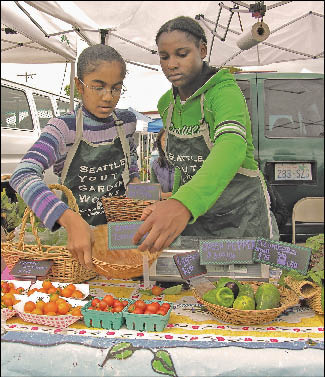Seattle, Wash.
(206) 632-0352
Objective of the program: Provide job training to homeless and underserved youth.
In a Nutshell: Seattle Youth Garden Works (SYGW) provides job training through garden-based education and employment. Youth grow organic produce and sell it at local farmers’ markets and garden fairs, and to a small number of local restaurants.
Youth work after school hours for 10 to 20 hours a week, earning a wage and a share of the profits. The initial program lasts 12 weeks, with a few youths continuing in leadership positions as “lead youth gardeners” for up to one year.
Where and When it Happens: At the University of Washington Botanic Gardens and at Marra Farm, in the South Park neighborhood.
 |
|
GROWTH THROUGH GROWING: Teens and young adults learn job and life skills by growing produce and selling it at local markets. Photo: SYGW |
Who Started it and Who Runs It: Margaret Hauptman founded SYGW in 1995 because she wanted to provide jobs and training for homeless youth in the University District. She had become aware of the disenfranchisement of street youth while she was volunteering at a drop-in center.
The organization is headed by Director Janice Dilworth, who oversees an urban farm and an employment development manager, an AmeriCorps manager and five AmeriCorps volunteers. SYGW uses about 300 additional volunteers each year.
Overcoming Obstacles: “It has been a challenge to maintain continuity over the years, with a constantly rotating staff,” Dilworth says. AmeriCorps workers were the first staff members, aside from the founder. Since then, the agency “has sought to integrate a full-time staff, with AmeriCorps playing a supportive role.”
Cost: The annual budget is $512,591. Youth are paid the state minimum wage of $7.93 an hour.
Who Pays: Paul G. Allen Family Foundations and the Edwards Mother Earth Foundation. The program also offsets costs through community partnerships with organizations, including University District Youth Center, YouthCare’s Orion Center, Neighborhood Farmers’ Market Alliance and the city’s summer youth employment program.
Youth Served: About 50 per year and 10 to 15 at any given time, ranging from ages 15 to 21. They come to SYGW through referrals from the juvenile justice system, transitional housing, other youth employment programs and schools, and by word of mouth. About 20 percent identify themselves as LGBT, and 80 percent have learning disabilities or other learning challenges, such as not being native speakers of English.
Youth Turn-On: “The Garden is a unique place to learn,” Dilworth says. “Working with the Earth is quiet and meditative, an important experience for urban and homeless youth, who are often separated from nature.”
Youth Turn-Off: “We work outside in the rain, even during the winter months,” Dilworth says.
What Still Gets in the Way: “Finding youth to apply is never a problem,” Dilworth says. But “especially when working with youth experiencing homelessness, getting them to commit to showing up to work every day can be a struggle.”































